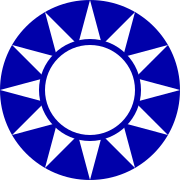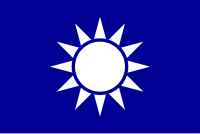Nationalist Party (1912)
|
Kuomintang of China
中國國民黨 Zhōngguó Guómíndǎng |
|
|---|---|
 |
|
| Chairman | Wu Den-yih |
| Secretary-General | Tseng Yung-chuan |
| Founded | 10 October 1919 |
| Preceded by |
Revive China Society (1894) Tongmenghui (1905) Nationalist Party (1912) Chinese Revolutionary Party (1914) |
| Headquarters | No.232~234, Sec. 2, BaDe Rd., Zhongshan District, Taipei, Republic of China (Taiwan) |
| Newspaper |
Central Daily News Kuomintang News Network |
| Think tank | National Policy Foundation |
| Youth wing | Kuomintang Youth League |
| Membership (2017) | 1,090,000 |
| Ideology |
Conservatism Liberal Conservatism Chinese nationalism Three Principles of the People Anti-communism |
| Political position |
Centre-right (present) Right-wing (historical) |
| National affiliation | Pan-Blue Coalition |
| International affiliation |
Centrist Democrat International International Democrat Union |
| Colours | Blue |
| Legislative Yuan |
35 / 113
|
| Municipal Mayoralties |
1 / 6
|
| City Mayoralties and County Magistracies |
5 / 16
|
| Local Councillors |
386 / 906
|
| Township Chiefs |
80 / 211
|
| Party flag | |
 |
|
| Website | |
| www.kmt.org.tw | |
| Kuomintang | |||||||||||||||||||||||||||||||||||||||||

"Kuomintang (Guómíndǎng)" in Traditional (top) and Simplified (bottom) Chinese characters
|
|||||||||||||||||||||||||||||||||||||||||
| Chinese name | |||||||||||||||||||||||||||||||||||||||||
|---|---|---|---|---|---|---|---|---|---|---|---|---|---|---|---|---|---|---|---|---|---|---|---|---|---|---|---|---|---|---|---|---|---|---|---|---|---|---|---|---|---|
| Traditional Chinese | |||||||||||||||||||||||||||||||||||||||||
| Simplified Chinese | |||||||||||||||||||||||||||||||||||||||||
| Literal meaning | "Nationals’ Party of China" | ||||||||||||||||||||||||||||||||||||||||
|
|||||||||||||||||||||||||||||||||||||||||
| Abbreviated to | |||||||||||||||||||||||||||||||||||||||||
| Traditional Chinese | 國民黨 | ||||||||||||||||||||||||||||||||||||||||
| Simplified Chinese | 国民党 | ||||||||||||||||||||||||||||||||||||||||
|
|||||||||||||||||||||||||||||||||||||||||
| Tibetan name | |||||||||||||||||||||||||||||||||||||||||
| Tibetan | ཀྲུང་གོའི་གོ་མིན་ཏང | ||||||||||||||||||||||||||||||||||||||||
|
|||||||||||||||||||||||||||||||||||||||||
| Zhuang name | |||||||||||||||||||||||||||||||||||||||||
| Zhuang | Cunghgoz Gozminzdangj | ||||||||||||||||||||||||||||||||||||||||
| Mongolian name | |||||||||||||||||||||||||||||||||||||||||
| Mongolian Cyrillic | Дундадын(Хятадын) Гоминдан(Хувьсгалт Нам) | ||||||||||||||||||||||||||||||||||||||||
| Mongolian script | ᠳᠤᠮᠳᠠᠳᠤ ᠶᠢᠨ (ᠬᠢᠲᠠᠳ ᠤᠨ) ᠭᠣᠮᠢᠨᠳᠠᠩ (ᠬᠤᠪᠢᠰᠬᠠᠯᠲᠤ ᠨᠠᠮ) |
||||||||||||||||||||||||||||||||||||||||
|
|||||||||||||||||||||||||||||||||||||||||
| Uyghur name | |||||||||||||||||||||||||||||||||||||||||
| Uyghur |
جۇڭگو گومىنداڭ
|
||||||||||||||||||||||||||||||||||||||||
|
|||||||||||||||||||||||||||||||||||||||||
| Manchu name | |||||||||||||||||||||||||||||||||||||||||
| Manchu script | ᠵᡠᠩᡬᠣ ᡳ ᡬᠣᠮᡳᠨᡩᠠᠩ |
||||||||||||||||||||||||||||||||||||||||
| Romanization | Jungg'o-i G'omindang | ||||||||||||||||||||||||||||||||||||||||
The Kuomintang of China (/ˈkwoʊˌmɪnˈtɑːŋ, -ˈtæŋ/,KMT; often translated as the Nationalist Party of China) is a major political party in the Republic of China (Taiwan) based in Taipei and is currently the opposition political party in the Legislative Yuan.
The predecessor of the Kuomintang, the Revolutionary Alliance (Tongmenghui), was one of the major advocates of the overthrow of the Qing Dynasty and the subsequent declaration of independence in 1911 that resulted in the establishment of the Republic of China. The KMT was founded by Song Jiaoren and Sun Yat-sen shortly after the Xinhai Revolution of 1911. Sun was the provisional President, but he later ceded the presidency to Yuan Shikai. Later led by Chiang Kai-shek, the KMT formed the National Revolutionary Army and succeeded in its Northern Expedition to unify much of mainland China in 1928, ending the chaos of the Warlord Era. It was the ruling party in mainland China until 1949, when it lost the Chinese Civil War to the rival communist People's Republic of China (PRC). Although it lost most of its territory on mainland China, the KMT retreated to Taiwan where it continued to govern as an authoritarian single-party state. This government retained China's UN seat (with considerable international support) until 1971.
...
Wikipedia
